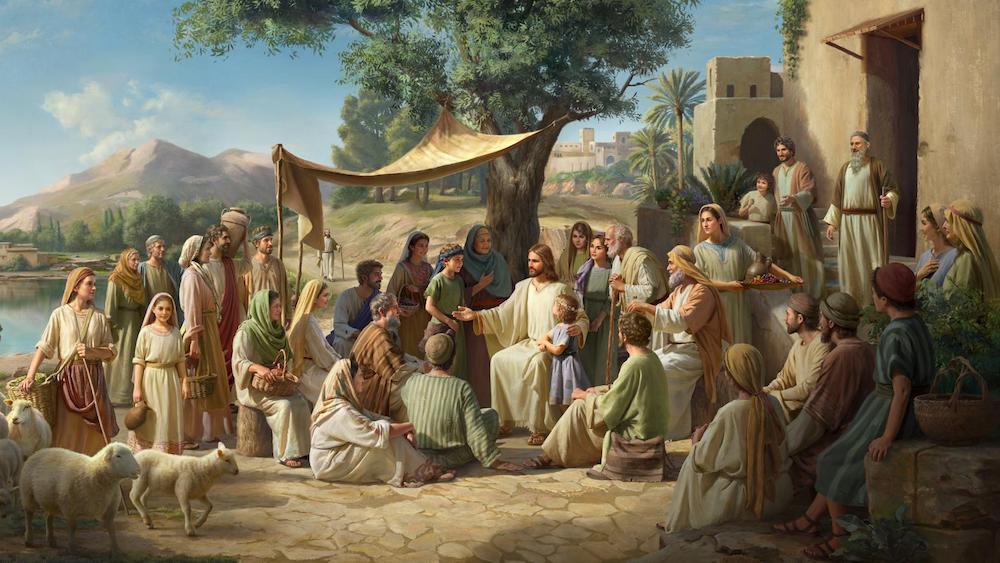3 Aspects of Significance of Jesus Speaking in Parables
When the Lord Jesus worked, He said many words to the people of that time. Some of them are very straightforward. For example, the Lord Jesus often said, “Truly, truly, I say to you …” Some are indirect, just as what the Lord Jesus said to Philip, “I am in the Father, and the Father in me” (John 14:10). But what really impressed me were the parables spoken by the Lord Jesus, such as the parable of the net, the parable of the shepherd seeking the lost sheep, the parable of an evil servant exacting a payment from a debtor, the parable of the return of the prodigal son, the parable of the marriage feast, the parable of the fig tree, and so on. Looking at these parables, I couldn’t help thinking: Why did the Lord Jesus speak these parables when He worked? What was His will hidden behind them?

With these questions, I kept praying to the Lord to seek His enlightenment. One day when I studied the Bible, I read these verses, “And the disciples came, and said to him, Why speak you to them in parables? He answered and said to them, Because it is given to you to know the mysteries of the kingdom of heaven, but to them it is not given. For whoever has, to him shall be given, and he shall have more abundance: but whoever has not, from him shall be taken away even that he has. Therefore speak I to them in parables: because they seeing see not; and hearing they hear not, neither do they understand. And in them is fulfilled the prophecy of Esaias, which said, By hearing you shall hear, and shall not understand; and seeing you shall see, and shall not perceive: For this people’s heart is waxed gross, and their ears are dull of hearing, and their eyes they have closed; lest at any time they should see with their eyes and hear with their ears, and should understand with their heart, and should be converted, and I should heal them. But blessed are your eyes, for they see: and your ears, for they hear” (Matthew 13:10–16). Pondering these verses carefully and praying and seeking in the words of the Lord Jesus, I had a little understanding of His words. It turned out that when the Lord Jesus was doing His work and preaching, there were many people who came to listen to His preaching, but not all of them were the ones who truly followed the Lord and walked in His way, such as the Pharisees. Their purpose of listening to the Lord’s preaching was not to seek the truth, but to find ways to accuse the Lord Jesus and tempt and frame Him. Some people followed the Lord Jesus because they saw that He had performed many miracles, that He could bestow grace and blessings upon man, and heal the sick and cast out demons. Their purpose was to gain more grace and blessings, not obey the Lord’s way and care for His will. Only a few followers were willing to follow the Lord because they loved the truth and saw the authority and power in His work and preaching, such as Peter, John, Jacob, and so on. Therefore, in order to gain those who truly believed in God and loved the truth, the Lord Jesus used parables to preach to all, expressing the truth to testify God’s work, God’s disposition, and to reveal the mysteries of the kingdom of heaven. All of those who loved the truth actively sought the Lord Jesus, so they attained enlightenment and guidance from the Holy Spirit and understood the meanings of the parables. However, those who didn’t love the truth but only asked for grace and blessings didn’t initiatively seek the meanings of His words, so they never understood the truth. In this way, the ones who had true faith in God and loved the truth, and those false believers and unbelievers who only asked for grace and blessings were separated and sorted according to their own kind. This fulfills what the Lord Jesus said, “Because it is given to you to know the mysteries of the kingdom of heaven, but to them it is not given. For whoever has, to him shall be given, and he shall have more abundance: but whoever has not, from him shall be taken away even that he has” (Matthew 13:11–12). This is the first aspect of the significance of why the Lord Jesus spoke parables when He worked.
Later, on a website I saw these words, “The first is the parable of the sower. This is a very interesting parable; sowing seeds is a common event in people’s lives. The second is the parable of the tares. Anyone who has planted crops, and certainly all adults, will know what ‘tares’ are. The third is the parable of the mustard seed. All of you know what mustard is, do you not? If you do not know, you can take a look in the Bible. The fourth parable is the parable of the leaven. Now, most people know that leaven is used for fermentation, and that it is something that people use in their daily lives. The further parables, including the sixth, the parable of the treasure; the seventh, the parable of the pearl; and the eighth, the parable of the net, were all drawn and sourced from people’s real lives. What kind of picture do these parables paint? It is a picture of God becoming a normal person and living alongside mankind, using the language of life, human language, to communicate with humans and to provide them with what they need. When God became flesh and lived among mankind for a long time, after He had experienced and witnessed people’s various lifestyles, these experiences became His teaching material through which He transformed His divine language into human language. Of course, these things that He saw and heard in life also enriched the Son of man’s human experience. When He wanted people to understand some truths, to understand some of God’s will, then He could use parables similar to the ones above to tell people about God’s will and His requirements of mankind. These parables were all related to people’s lives; there was not a single one that was out of touch with human lives. When the Lord Jesus lived with mankind, He saw farmers tending their fields, and He knew what tares were and what leavening was; He understood that humans love treasure, so He used the metaphors of both the treasure and the pearl.” “This was the advantage of God becoming flesh: He could take advantage of mankind’s knowledge and use human language to speak to people, and to express His will. He explained or ‘translated’ to man His profound, divine language that people struggled to understand in human language, in a human way. This helped people understand His will and know what He wanted to do.”
From these words I understood that the reason the Lord Jesus spoke many parables when He worked, was to allow His followers to better understand God’s intentions and His different requirements of people, so that they would worship Him with heart and honesty. In the Age of Law, Jehovah God used prophets to convey His words to man, but those words were all prophecies and the followers at that time were unable to directly understand the meaning of them. Even today, we are still incapable of clearly figuring out many prophecies of the prophets. This is the truth. When the Lord Jesus was incarnated as the Son of man to work on earth and used human language to tell people the intentions and requirements of God, we could better understand and grasp the truth in His words, and it helped us know His work and disposition and understand all the pain and effort of His salvation of mankind. Just as the Lord Jesus used the parable of the lost sheep to express His love for mankind—God wants every person to be saved, and does not want anyone to perish. As long as one is a true believer, even if he takes the wrong path temporarily, God will strive to rescue him. Such purpose of the Lord Jesus speaking in human language to allow us to better understand His requirements, fulfills the words in the Bible, “That it might be fulfilled which was spoken by the prophet, saying, I will open my mouth in parables; I will utter things which have been kept secret from the foundation of the world” (Matthew 13:35). This is the second aspect of significance of why the Lord Jesus spoke parables when He worked.
I went on reading, “He could also have conversations with people from the human perspective, using human language, and communicate with people in a way they understood. He could even speak and work using human language and knowledge so that people could feel God’s kindness and closeness, so that they could see His heart.” From these words I understood that when the Lord Jesus was working and preaching, He spoke the parables using human language, for they are easy to understand and they could allow us to feel God’s kindness and loveliness and bring us closer to Him. Think back to the Age of Law: When God didn’t become flesh to do His work, He spoke to Moses out of the burning bush; He spoke to the Israelites on Mount Sinai; He spoke to Job in the wind. At that time when people heard God speaking, they felt fearful and dared not to confront Him or get close to Him, much less could they quiet their hearts to seek the meaning of His words. However, in the Age of Grace, God incarnate used human language to do His work and preach, teaching people to understand His way by using parables, which allowed us to feel that God is no longer unapproachable to us or the One who let us stand in awe, and to feel God’s consideration and kindness to us so that we can—face-to-face—seek His intentions, accept His work and leading, and gain His redemption. This is the third aspect of significance of why the Lord Jesus spoke parables when He worked.
From God’s work we can see that God became flesh to express the truth and used human language to speak to us mankind for the purpose that we can more easily know His intentions and requirements and understand and practice the truth, and thus we can cast off our corrupt disposition, be cleansed and changed, and become the ones who know God, obey God, and worship God. Thank God. All the Glory be to God!
- Extended Reading:
- Why Was Jesus Baptized?








